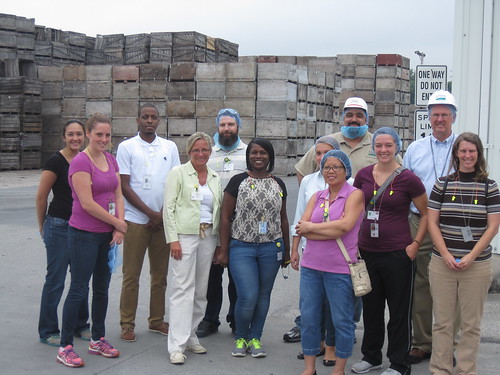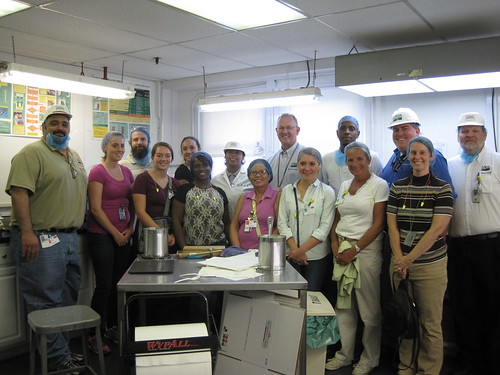
Across the country, schools are back in session. Here at the USDA’s Agricultural Marketing Service (AMS), our inspectors and procurement specialists work hard to make sure that quality, domestically-produced foods are delivered to students and other recipients for our federal food purchasing programs. As students are getting used to their new schedules, we would like to highlight how our own little field trip shed some light on a typical day for some of our employees.
A team of AMS employees recently traveled to Knouse Foods, a grower-owned cooperative that supplies apple and cranberry products for federal food purchasing programs. The employees saw first-hand how USDA inspectors help Knouse and other companies verify the quality of their products. As the apple sauce traveled through the facility, USDA inspectors pulled random samples to make sure that they met product quality and condition requirements. All USDA Foods are required to be inspected, and in this case, inspectors pulled samples of apple sauce to evaluate traits like its color, flavor, and consistency. As an independent third-party, the inspections help suppliers meet USDA Foods requirements but they also can help them meet requirements from other buyers.
The tour also covered another important part of the procurement process – the delivery. In addition to the food inspection requirement, all contracts for federal food purchasing programs require delivery trucks to be inspected. The team got a chance to see this process, called check-loading. USDA inspectors checked the condition of the trailers, making sure that the trailer is clean, doesn’t contain any holes, and has updated inspection codes.
For the Commodity Procurement Program specialists, the trip gave them a chance to see how some of the contract provisions are carried out by both the suppliers and USDA inspectors.
Whether it’s telling them about the procurement process or product specifications and requirements, the procurement specialists are always in constant contact with their vendors. The recent trip helped the specialists see how the vendors incorporate inspections and check-loading into their business plans. They saw how long it takes for trucks to be inspected and the impact it has on their deliveries.
All of us here at AMS are proud to play a role in supporting American ag businesses by ensuring that they can provide quality, wholesome foods to our students and other federal food purchase program recipients. We wish all of our students a successful 2015 school year. We encourage businesses to learn more about how our Specialty Crops Inspection Division and our Commodity Procurement Program can support their business.




